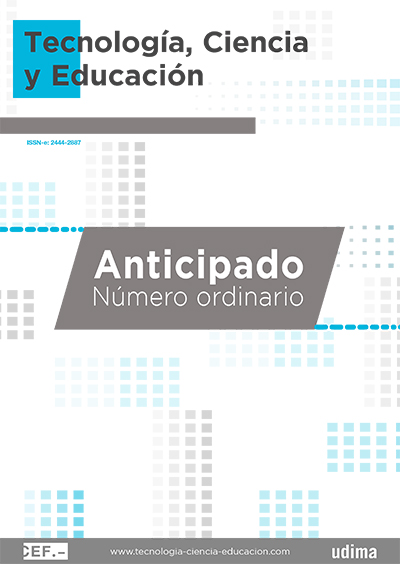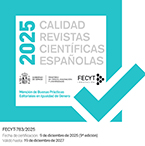Transmedia storytelling with university students: digital and communicative competence and attitudes towards inclusion
DOI:
https://doi.org/10.51302/tce.2025.24467Keywords:
primary education, strategies, educational innovation, inclusive culture, transmedia storytelling, technology, universityAbstract
This service-learning project presents a teaching innovation experience based on the transmedia narrative methodology. This methodology allows the development of creative activities that encourage motivation, participation, creativity, collaborative work and the development of digital competence in university students, with the aim of fostering attitudes towards an inclusive culture. The purpose of this study is to empirically assess the results of the implementation of the project and to evaluate the impact of the transmedia methodology in the university classroom. The context of application was the University of Valladolid, in the Campus of Palencia, during the second semester of the academic year 2023/2024. The participants were 101 students (67 women and 34 men) and 2 teachers. Of the total number of students, 38 belonged to the double degree in Early Childhood and Primary Education, and 63 students of the degree in Primary Education. The subject involved was Research Methods and Innovation in Education. In order to systematise the results, the instrument called «Decalogue of Self-Evaluation for Classroom Activities» was used. The findings show that the proposal helped teachers to be more conscious, intentional and systematic in the use of strategies aimed at promoting critical thinking, reflection and self-learning.
Downloads
References
Adewojo, A. y Adefila, E. (2025). Game-changing libraries: enhancing information literacy through gamification. Business Information Review, 42(2), 106-111. https://doi.org/10.1177/026638212513288
Alexander, B. (2017). The New Digital Storytelling: Creating Narratives with New Media-Revised and Updated Edition. Bloomsbury Publishing USA.
AlQhtani, F. M. (2025). Knowledge management for research innovation in universities for sustainable development: a qualitative approach. Sustainability, 17(6), 1-26. https://doi.org/10.3390/su17062481
Amador-Baquiro, J. C. (2018). Educación interactiva a través de narrativas transmedia: posibilidades en la escuela. Magis: Revista Internacional de Investigación en Educación, 10(21), 77-94. https://doi.org/10.11144/Javeriana.m10-21.eint
Arancibia Martini, H., Castillo Armijo, P. E. y Saldaña Fernández, J. (2018). A vueltas con la innovación educativa. En H. Arancibia Martini, P. E. Castillo Armijo y J. Saldaña Fernández (Coords.), Innovación educativa: perspectivas y desafíos (pp. 7-16). Universidad de Valparaíso. https://dialnet.unirioja.es/servlet/libro?codigo=719973
Castañeda Quintero, L. J. y Adell, J. (2013). Entornos personales de aprendizaje: claves para el ecosistema educativo en red. Editorial Marfil.
Chalmers, D., Stoney, S., Goody, A., Goerke, V. y Gardiner, D. (2012). Identification and Implementation of Indicators and Measures of Effectiveness of Teaching Preparation Programs for Academics in Higher Education. Final Report. Council of Australian Directors for Academic Development.
Consejo de la Unión Europea. (2024). Recomendaciones del Consejo de 23 de noviembre de 2023 sobre la mejora de la provisión de capacidades y competencias digitales en la educación y la formación (C2024/1030). Diario Oficial de la Unión Europea. http://data.europa.eu/eli/C/2024/1030/oj
Efverlund, Y. (2024). Transmedia Storytelling: a Potential Method to Inspire and Motivate Reading in ESL Classrooms. Malmö University.
Ferguson-Sams, N., Howell, E., Kaminski, R., Pennington, V., Gazioglu, M., Mittapalli, K. y Banerjee, A. (2024). A crosswalk of digital storytelling and multilingual learning. Middle School Journal, 55(3), 27-36. https://doi.org/10.1080/00940771.2024.2329511
Fundación Telefónica. (2014). Decálogo de un proyecto innovador. https://publiadmin.fundaciontelefonica.com/media/publicaciones/341/Info_DecalogoInnovacion06.pdf
Graesser, A., Foltz, P. W., Rosen, Y., Shaffer, D. W., Forsyth, C. y Germany, M. L. (2018). Challenges of assessing collaborative problem solving. En E. Care, P. Griffin y M. Wilson (Eds.), Assessment and Teaching of 21st Century Skills: Research and Applications (pp. 75-91). Springer International Publishing.
Greenhow, C. y Chapman, A. (2020). Social distancing meet social media: digital tools for connecting students, teachers, and citizens in an emergency. Information and Learning Sciences, 121(5/6), 341-352. https://doi.org/10.1108/ILS-04-2020-0134
Gutiérrez-Martín, A. y Tyner, K. (2012). Media education, media literacy and digital competence. Comunicar, 38, 31-39. https://doi.org/10.3916/C38-2012-02-03
Imbernón Muñoz, F. (2006). Actualidad y nuevos retos de la formación permanente. Revista Electrónica de Investigación Educativa, 8(2), 1-11. http://redie.uabc.mx/vol8no2/contenido-imbernon.html
Ingvarson, L., Meiers, M. y Beavis, A. (2003). Evaluating the Quality and Impact of Professional Development Programs. ACEReSearch. https://research.acer.edu.au/professional_dev/3
Jenkins, H. (2006). Convergence Culture. Where Old and New Media Collide. Nueva York University Press.
Jenkins, H. (2010). Transmedia storytelling and entertainment: an annotated syllabus. Continuum, 24(6), 943-958. https://doi.org/10.1080/10304312.2010.510599
Jiang, Z., Huo, M.-L., Jones, J., Cheng, Z., Manoharan, A. y Spoehr, J. (2025). Thriving in future work: knowledge management and innovation perspectives. Knowledge Management Research & Practice, 23(1), 1-12. https://doi.org/10.1080/14778238.2024.2344347
Kayyali, M. (2024). Quality enhancement frameworks in higher education. En C. Palgrave (Ed.), Quality Assurance and Accreditation in Higher Education: Issues, Models, and Best Practices (pp. 61-141). Springer Nature. https://doi.org/10.1007/978-3-031-66623-0
Kritsotaki, K., Castro-Kemp, S. y Kamenopoulou, L. (2024). Digital storytelling: an educational approach for enhancing dyslexic children´s writing skills, critical and cultural learning. Journal of Research in Special Educational Needs, 25(2), pp. 289-311. https://doi.org/10.1111/1471-3802.12722
LOSU. (2023). Ley orgánica 2/2023, de 22 de marzo, del sistema universitario (Boletín Oficial del Estado [BOE] núm. 70, de 23 de marzo de 2023, pp. 38.087-38.182). https://www.boe.es/eli/es/lo/2023/03/22/2
Lozova, T. (2024). Educational innovations in higher education: essence and classification. Economic Innovations, 26(4[93]), 105-115. https://doi.org/10.31520/ei.2024.26.4(93).105-115
Lucas Mangas, S. (2021). Aprendizaje-servicio en la universidad. Desarrollo de proyectos emprendedores socialmente responsables con la comunidad.Dykinson.
Lucas Mangas, S. y Mohino Andrés, J. (Coords.). (2025). Guía educativa: formación de actitudes hacia una cultura inclusiva. Proyecto de aprendizaje-servicio «Conociéndonos». Universidad de Valladolid/Federación de Asociaciones de Plena Inclusión Castilla y León. https://rsu.uva.es/wp-content/uploads/2025/03/guia_conociendonosUVa_PlenaInclusion.pdf
Lungu, B. y Lungu, M.ª. (2021). Exploring the effects on student learning and engagement of COVID-19: an innovative and interdisciplinary approach. Journal of Microbiology & Biology Education, 22(1). https://doi.org/10.1128/jmbe.v22i1.2429
Macanchí Pico, M. L., Bélgica Marlene O. C. y Campoverde Encalada, M. A. (2020). Innovación educativa, pedagógica y didáctica. Concepciones para la práctica en la educación superior. Universidad y Sociedad, 12(1), 396-403.
Manganello, F. y Baldacci, M. (2024). Digital stories and inclusive cultures at school: a research study in an Italian primary multicultural classroom. Education Sciences, 14(10), 1-16. https://doi.org/10.3390/educsci14101108
Martínez Bonafé, J. y Rogero Anaya, J. (2021). El entorno y la innovación educativa. REICE. Revista Iberoamericana sobre Calidad, Eficacia y Cambio en Educación, 19(4), 71-81. https://doi.org/10.15366/reice2021.19.4.004
Martínez-Rodríguez, R.-C. y Benítez-Corona, L. (2020). The ecology of resilience learning in ubiquitous environments to adverse situations. Comunicar, 62, 43-52. https://doi.org/10.3916/C62-2020-04
Meyerhofer-Parra, R. y González-Martínez, J. (2023). Transmedia storytelling usage of neural networks from a universal design for learning perspective: a systematic review. Frontiers in Psychology, 14. https://doi.org/10.3389/fpsyg.2023.1119551
Moloney, K. y Unger, M. (2014). Transmedia storytelling in science communication: one subject, multiple media, unlimited stories. En J. Drake, Y. Kontar y G. Rife (Eds.), New Trends in Earth-Science Outreach and Engagement (pp. 107-123). Springer. https://doi.org/10.1007/978-3-319-01821-8_8
Morales, P. (2010). Investigación e innovación educativa. REICE. Revista Iberoamericana sobre Calidad, Eficacia y Cambio en Educación, 8(2), 47-73. https://doi.org/10.15366/reice2010.8.2.003
Moreno, M.ª G. (2000). Formación de docentes para la innovación educativa. Revista Electrónica Sinéctica, 17, 24-32.
Palioura, M. y Dimoulas, C. (2022). Digital storytelling in education: a transmedia integration approach for the non-developers. Education Sciences, 12(8), 1-33. https://doi.org/10.3390/educsci12080559
Pascual, J. (2019). Innovación educativa: un proceso construido sobre relaciones de poder. Revista Educación, Política y Sociedad, 4(2), 9-30. https://doi.org/10.15366/reps2019.4.2.001
Perry, M. S. (2020). Multimodal engagement through a transmedia storytelling project for undergraduate students. GEMA Online Journal of Language Studies, 20, 19-40. http://doi.org/10.17576/gema-2020-2003-02
Rocca, S. (2025). Unpacking digital literacies and multiliteracies. En C. Palgrave (Ed.), DIGICOMPASS: Navigating Digital Multiliteracies in Global Language Education (pp. 73-95). Springer Nature. https://doi.org/10.1007/978-3-031-81318-4_4
Rodrigues, P. S., Batista, J. y Simões, D. (2023). ¿Tiene el «story-making» el potencial de atraer a los prosumidores en torno a la marca de una institución de educación superior?: el caso de la Universidad de Aveiro. 18.ª Conferencia Ibérica de Sistemas y Tecnologías de la Información (pp. 1-6), Aveiro, Portugal. IEEE. https://doi.org/10.23919/CISTI58278.2023.10211427
Rodrigues, P. y Bidarra, J. (2014). Transmedia storytelling and the creation of a converging space of educational practices. iJET. International Journal of Emerging Technologies in Learning, 9(6), 42-48. https://doi.org/10.3991/ijet.v9i6.4134
Ryan, M.-L. (2015). Transmedia storytelling: industry buzzword or new narrative experience? Storyworlds: A Journal of Narrative Studies, 7(2), 1-19. https://doi.org/10.5250/storyworlds.7.2.0001
Salmon, A. K. y Lucas, T. (2011). Exploring young children´s conceptions about thinking. Journal of Research in Childhood Education, 25(4), 364-375. https://doi.org/10.1080/02568543.2011.605206
Schimmelpfeng, L. E., Ulbricht, V. R., Fadel, L., Batista, C. R. y Souza Sombrio, G. de. (2017). The production of learning objects with accessibility for people with disabilities from strategies of gamification and transmedia storytelling. Twelfth Latin American Conference on Learning Technologies (pp. 1-4). IEEE. https://doi.org/10.1109/LACLO.2017.8120911
Scolari, C. A. (2013). Narrativas transmedia: cuando todos los medios cuentan. Deusto.
Scolari, C. A., Lugo Rodríguez, N. y Masanet, M.ª-J. (2019). Educación transmedia. De los contenidos generados por los usuarios a los contenidos generados por los estudiantes. Revista Latina de Comunicación Social, 74, 116-132. https://doi.org/10.4185/RLCS-2019-1324
Sein-Echaluce, M.ª L., Fidalgo-Blanco, Á. y Alves, G. (2017). Technology behaviors in education innovation. Computers in Human Behavior,72, 596-598. http://dx.doi.org/10.1016/j.chb.2016.11.049
Selfa-Sastre, M., Pifarré, M., Cujba, A., Cutillas, L. y Falguera, E. (2022). The role of digital technologies to promote collaborative creativity in language education. Frontiers in Psychology, 13, 1-13. https://doi.org/10.3389/fpsyg.2022.828981
Shemshack, A. y Spector, J. M. (2020). A systematic literature review of personalized learning terms. Smart Learning Environments, 7(1), 1-20. https://doi.org/10.1186/s40561-020-00140-9
Sindoni, M. G. y Moschini, I. (Eds.). (2021). Multimodal Literacies Across Digital Learning Contexts. Routledge. https://doi.org/10.4324/9781003134244
Skenderi, F. y Skenderi, L. (2023). Fostering innovation in higher education: transforming teaching for tomorrow. Knowledge-International Journal, 60(2), 251-255.
Song, Y., Gilardi, F. y Lam, C. (2023). Building culturally sustainable communities. Community museums and transmedia storytelling. Museum Management and Curatorship, 39(1), 2-19. https://doi.org/10.1080/09647775.2023.2209868
Stefani, L. (2005). Academic development and its relationship to teaching and the student learning experience. Educational Developments, 6(4). https://www.seda.ac.uk/wp-content/uploads/2020/09/Educational-Developments-6.4.pdf
Svoboda, P. y Knihová, L. (2025). Exploring the future of education: integrating metaverse and AI tools to enhance learning experiences. TEM Journal, 14(1), 631-643. https://doi.org/10.18421/TEM141-56
Tabish, S. A. (2024). Establishing world-class universities: a conceptual approach. En S. A. Tabish (Ed.), Health Care Management: Principles and Practice (pp. 703-733). https://doi.org/10.1007/978-981-97-3879-3_33
Val Noguera, E. del y González Sorribes, A. (2020). Transmedia storytelling edutainment experience in engineering studies. INTED2020 Proceedings: 14th International Technology, Education and Development Conference (pp. 5.566-5.572), del 2 al 4 de marzo, Valencia, España. https://doi.org/10.21125/inted.2020.1510
Wahjuningsih, E., Santihastuti, A., Kurniawati, I. y Arifin, U. M. (2020). Storyboard that platform to boost students´ creativity: Can it become real? IOP Conference Series: Earth and Environmental Science, 485, 1-7. https://doi.org/10.1088/1755-1315/485/1/012095
Downloads
Published
How to Cite
Issue
Section
License
Copyright (c) 2025 María del Carmen Herguedas Esteban, José Luis Rodríguez Sáez, Brizeida Hernández Sánchez, Susana Lucas Mangas

This work is licensed under a Creative Commons Attribution-NonCommercial-NoDerivatives 4.0 International License.


























